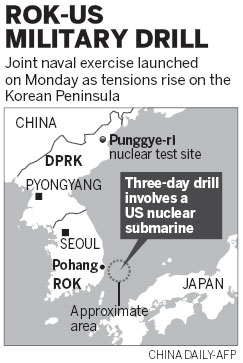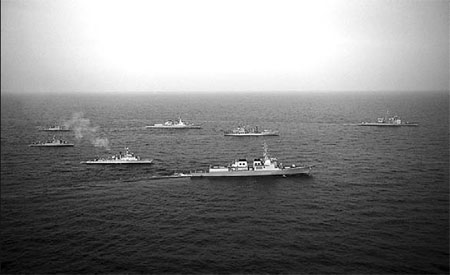US, ROK conduct joint drill
Updated: 2013-02-05 07:47
By Zhou Wa and Zhang Yunbi in Beijing (China Daily)
|
||||||||
|
This handout photo released by the ROK Joint Chiefs of Staff on Monday shows Republic of Korea and US warships during a joint naval exercise in the East Sea (Sea of Japan) off the southeastern ROK port of Pohang. South Korea Joint Chiefs of Staff via Agence France-Presse |

Beijing says China alone can't stop DPRK from a third nuclear test
Political mediation efforts by members of the Six-Party Talks coincided with the ongoing military drill between Seoul and Washington on Monday, as the possibility of another nuclear test by Pyongyang hung above the Korean Peninsula.
Wu Dawei, special representative of the Chinese government on the Korean Peninsula affairs exchanged views with his counterpart from the Republic of Korea, Lim Sung-nam, on the latest situation on the peninsula, Yonhap News Agency cited an official as saying.
Chinese Foreign Ministry spokeswoman Hua Chunying urged all parties to avoid increasing tensions on Monday in the current sensitive situation and called for restraint.
Maintaining peace and stability is in the interests of all parties, she said.
China has made great efforts to persuade the Democratic People's Republic of Korea to halt its nuclear program, but China's efforts alone may not be as effective as the ROK and its ally the United States expect, observers said.
Beijing will not simply take part in Seoul's alliance, although the ROK has pursued that goal, said Huang Youfu, a professor of the Korean Peninsula at the Minzu University of China.
"If Pyongyang has made up its mind to conduct the test, China's persuasion will not work," he said, adding that the nuclear issue on the Korean Peninsula is not triggered only by Pyongyang and China alone cannot solve the issue.
Wang Junsheng, a researcher on East Asian studies with the Chinese Academy of Social Sciences, said that what Pyongyang is pursuing is for Washington to treat it as an equal counterpart and respect its security concerns.
Meanwhile, the ROK and the US began a three-day joint naval exercise involving a US nuclear submarine on Monday, which was interpreted by analysts as a further provocation against the DPRK.
Yonhap on Friday cited Joint Chiefs of Staff Chairman General Jung Seung-jo as saying that the joint drill aims to guard against possible DPRK provocations involving submarines.
"The exercise includes at-sea operational training, detecting and tracking a submarine, anti-air and anti-ship live-fire training and anti-missile training," Yonhap quoted a military official as saying.
The drill is targeting Pyongyang, but it will hardly act as a deterrent on the DPRK's nuclear attempt, Huang said, adding that the nuclear plan offers Washington an excuse to further increase its military presence in East Asia.
The DPRK threatened to conduct a third nuclear test after the UN Security Council passed a resolution to expand sanctions against Pyongyang for its rocket launch on Dec 12.
According to a Yonhap report on Monday, Pyongyang denounced the latest UN sanctions as a "grave obstacle" to its efforts to rebuild its economy, saying such sanctions won't work and will only harden its resolve to further strengthen its self-defense capabilities.
Pyongyang is turning to nuclear weapons because it is confronted with difficulties in developing its economy under sanctions, and this mentality is very dangerous, said Huang.
The DPRK's Korean Central News Agency reported on Sunday that Pyongyang's top leader, Kim Jong-un, had chaired a high-level meeting with military officials to discuss a "great turn" in strengthening military capability and issued "important" guidelines to top officials.
Recent satellite imagery has confirmed activity at the northeastern nuclear test site in the DPRK, which covered the entrance to a test tunnel in an attempt to inhibit external monitoring, according to AFP.
Yonhap citied officials in Seoul as saying that the DPRK has completed all preparations and can detonate a nuclear device at any time.
Shi Yuanhua, director of Center for Korean Studies under the Institute of International Studies of Fudan University in Shanghai, said that the ROK's launch of its first rocket, Naro, last week provoked the DPRK to some degree and caused Pyongyang's resistance.
US Secretary of State John Kerry talked with his ROK counterpart on Monday, agreeing on the need to ensure that Pyongyang understands that it will face significant consequences from the international community if it continues its provocative behavior, The Associated Press reported.
Contact the writers at zhouwa@chinadaily.com.cn and zhangyunbi@chinadaily.com.cn
(China Daily 02/05/2013 page11)

 In Photos: 7.0-magnitude quake hits Sichuan
In Photos: 7.0-magnitude quake hits Sichuan
 Li Na on Time cover, makes influential 100 list
Li Na on Time cover, makes influential 100 list
 FBI releases photos of 2 Boston bombings suspects
FBI releases photos of 2 Boston bombings suspects
 World's wackiest hairstyles
World's wackiest hairstyles
 Sandstorms strike Northwest China
Sandstorms strike Northwest China
 Never-seen photos of Madonna on display
Never-seen photos of Madonna on display
 H7N9 outbreak linked to waterfowl migration
H7N9 outbreak linked to waterfowl migration
 Dozens feared dead in Texas plant blast
Dozens feared dead in Texas plant blast
Most Viewed
Editor's Picks

|

|

|

|

|

|
Today's Top News
Live report: 7.0-magnitude quake hits Sichuan, heavy casualties feared
Boston suspect cornered on boat
Cross-talk artist helps to spread the word
'Green' awareness levels drop in Beijing
Palace Museum spruces up
First couple on Time's list of most influential
H7N9 flu transmission studied
Trading channels 'need to broaden'
US Weekly

|

|








